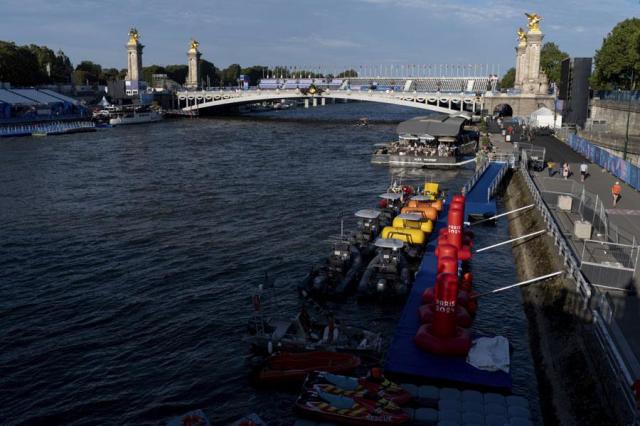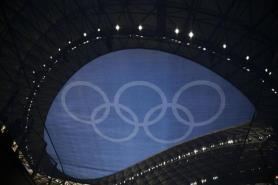
Faecal contamination of the Seine, which winds 777 kilometers through northern France, exceeded the bathing quality standard for safe swimming just two days before the men's and women's triathlon races. Athletes testing the waters before making the plunge to compete have become accustomed to such setbacks. Just a year earlier, the open-water swimming world cup and the para triathlon test event and mixed relay competition in the Seine were cancelled due to the low quality of the water. No wonder athletes were worried ahead of Paris 2024.
The Seine is burdened with an enormous population (12.3 million people live in the region surrounding Paris) and a low river flow that cannot easily dilute pollution. A 19th-century combined sewer system is expected to manage a lot of wastewater: rainwater flows over roads, fields and rooftops and enters the sewer system, accumulating oil, heavy metals, animal faeces and pesticides along the way.
Combined with untreated sewage from homes and businesses, sewer water flow often strains the capacity of the network and treatment plants. To prevent backflow, untreated wastewater is discharged into the Seine through 200 outlets. This is commonly known as a combined sewer overflow.
The result is a murkier river with less oxygen dissolved in it and a higher concentration of faecal bacteria. During one intense rainstorm, the level of E coli and Enteroccus bacteria discharged into the Seine from one outfall rose nearly 100 times compared to a dry weather period.
Climate change could degrade the river further. Regional-scale climate models project more short and sharp downpours during the summer. The years 2016, 2022, 2023 and now 2024 have all seen heavy rainfall during June and July.
Cleaning up the Seine
Local authorities have tried several strategies to improve the Seine’s water quality. The city’s “swimming plan” has cost €1.4 billion (£1.2 billion) since Paris was awarded the Games in 2016. This equates to €5.2 million per athlete competing in the Olympic and Paralympic open-water swimming and triathlon events.
Paris has invested this money in the Marne Aval and Seine Valenton wastewater treatment plants. These facilities have increased the treatment capacity of the Paris sewer system and are estimated to have reduced the annual volume of untreated sewage entering the Seine from 90 million cubic metres in 2003 to 15 million in 2018.
The city also built the Austerlitz reservoir in the 13th arrondissement, which intercepts runoff from stormwater drains and channels the water into a tank. This is supposed to delay or prevent the sewer system being overloaded.
All moored boats on the Seine must now be connected to the sewer system to avoid raw sewage dumping, too. A €6,000 grant was offered to 20,000 Parisian households sending wastewater directly into the river to update their drainage system.
Despite these efforts, conditions during pre-Olympic events in 2023 raised concerns. At the Paris test event, faecal concentrations exceeded the safe limit as heavy rain on July 28 had caused E coli levels to surge. This forced organizers to cancel a round of the open-water swimming world cup scheduled to be held in early August of that year.
Keeping athletes safe
Research suggests that open-water swimmers can suffer gastrointestinal symptoms, eye and skin infections and respiratory illnesses from swimming in polluted water. The risk to athletes is heightened by suppressed immune systems, which can result from intensive competition and training.
Athletes help us understand safe environmental standards for competition and training. Toby Robinson and Hector Pardoe will represent Great Britain in the marathon swimming event at Paris 2024. Both athletes are aware of water quality issues in Paris and have experienced similar problems in other countries, yet the duo are determined to swim whatever the risks.
Open-water swimmers can at least mitigate these. In a similar way to runners preparing for outdoor air pollution, swimmers can minimize their exposure to by training in clean-water venues and being especially careful not to swallow water while swimming. During competition, 75 percent of triathletes have reported water ingestion, especially during the "feed zone," the part of each lap when swimmers are handed a drink
Heavy rainfall forced event organizers to cancel a triathlon training session on Sunday, July 28. Further changes to the training and competition schedule are possible and should be considered by athletes and coaches. If E coli levels remain high until August 2, the swimming leg will be cut from the three-sport race. The Vaires-sur-Marne, east of Paris, is hosting the rowing competitions at least provides an alternative venue to the Seine.
Extreme weather threatens the water quality of the Seine and its ability to host a safe Olympic Games. Athletes, event organizers and team managers must cooperate to limit the health risk, uphold the integrity of this Olympic discipline and prevent a crap experience for competitors.
-------------------------------------------------------------------------------------------------------------------------
Jamie Wilks is a PhD Candidate, sport ecology at Loughborough University in England.
Loïs Mougin is a PhD Candidate in exercise and environmental physiology at Loughborough University in England.
This article was republished under a Creative Commons license with The Conversation. The views and opinions in this article are solely those of the authors.
https://theconversation.com/paris-2024-olympics-is-open-water-swimming-in-the-seine-safe-215628
Copyright ⓒ Aju Press All rights reserved.



